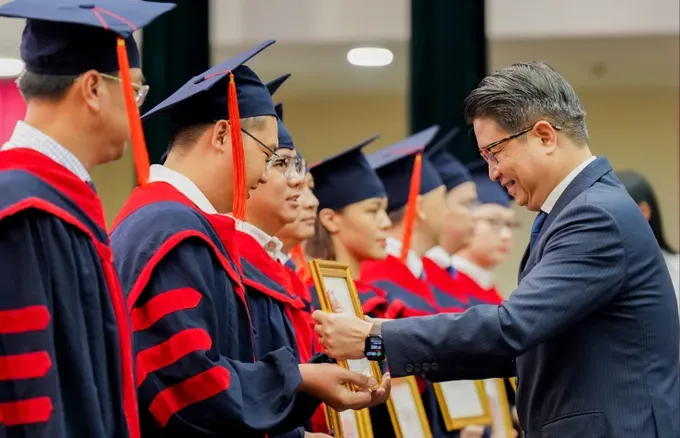
The Department of Science, Technology, and Information under the Education and Training Ministry (MoET) confirmed that the education sector has substantially completed the development of comprehensive databases spanning preschool, K-12, continuing, and higher education. Information crucial for management across all educational tiers has been largely digitized.
Furthermore, the sector’s data has been successfully integrated with national databases for population and insurance, enabling the utilization of specialized data for optimized management.
A key forthcoming MoET initiative is the rollout of digital degrees, encompassing everything from high school diplomas to higher education and postgraduate qualifications. According to the Department of Science, Technology, and Information, while a degree represents an output, it will be intrinsically linked to input data and the entire training lifecycle.
This constitutes a vital step towards bolstering the management of the educational continuum, from admission to graduation, thereby curbing issues related to fraudulent qualifications and other malpractices concerning degrees.
For degrees conferred by domestic higher education institutions, the MoET has established an information lookup system for degrees and certificates. The search software, developed by the Quality Management Department, currently hosts nearly 5 million records, facilitating verification by organizations and individuals as needed.
The Quality Management Department has also been instrumental in advising on the creation of a national database for degrees and certificates. This aims to streamline management processes, simplify administrative procedures for citizens, and significantly contribute to preventing and combating the production, sale, and use of counterfeit academic credentials.
Higher education institutions are actively digitizing student information, encompassing admissions data, academic performance records, and degrees issued decades ago.
Hanoi University of Science and Technology pioneered an advanced digital degree solution, similar to systems at international universities like Stanford/Harvard. This software supports specialized Government Cipher Committee and public digital signatures (Viettel, VNPT, MISA), facilitating full template digitization and convenient authentication via QR codes.
Concurrently, Vietnam National University-HCMC members have uploaded data to the MoET’s central system and developed websites for undergraduate/postgraduate degree lookup.

Vice President Tran Dinh Ly of Nong Lam University-HCMC highlighted the manifold benefits of digitizing academic credentials for all stakeholders.
“Learners will find it effortless to look up and authenticate their degrees anytime, anywhere, without concerns about loss or verification delays,” he noted. “For employers, it translates to time savings and precise verification of candidate information. Training institutions stand to gain improved management efficiency, reduced administrative burdens, and enhanced transparency and modernization of processes. State management agencies will benefit from streamlined statistics gathering, inspection, and data analysis crucial for sectoral governance and policy formulation.”
President Hoang Van Phuc of Saigon Polytechnic College emphasized that digitizing academic credentials is a potent tool against degree fraud, a pervasive societal issue. When degrees are encrypted, embedded with QR codes, integrated into a system, and verifiable online, acts of counterfeiting, content alteration, or the use of illicit qualifications become significantly more challenging.
Head Phung Quan of the Organization and Administration Department under the University of Science (Vietnam National University-HCMC) stressed needing robust technical infrastructure – servers, software, security – and standardized data protocols for synchronized degree digitization.
His university is digitizing older undergraduate (from 2004) and postgraduate (from 2017) degrees. This initiative has significantly reduced administrative tasks, optimized efficiency, improved data connectivity, and allows easy online verification, enabling learners and employers to instantly retrieve degree information via their official website.
Vice President of Lac Hong University Assoc Prof Dr Nguyen Vu Quynh shared that the Government’s Decision 131/QD-TTg on enhancing IT application and digital transformation in education (2022-2025, with a vision to 2030) mandates schools to invest in infrastructure, ensure data security, and bolster staff capabilities. This signals a national-level strategic commitment to digital transformation.
For smooth degree and certificate digitization, training institutions must achieve consensus on synchronized conditions. This includes increasing investment in technical infrastructure, developing specialized software for managing and retrieving credentials, and training staff for effective system operation. Crucially, a clear legal framework with specific policies for credential management is paramount.
According to Head Bui Hoang Thang of the Student Affairs Department under HCMC University of Technology (Vietnam National University-HCMC), digitizing academic credentials is an unavoidable digital-era progression, enhancing transparency and speeding up verification; current technology suffices. Infrastructure can start simple for lookups, then upgrade for broader management and sharing with issuing units.
His university began digitizing undergraduate degrees in 2001 and continues with older records for utmost verification convenience. This inevitable trend demands a robust legal framework and efficient management and lookup systems. Degree-issuing bodies must prepare for digital credential issuance. While physical degrees hold symbolic value, digital document submission for applications must be permitted, marking a necessary shift.
Chairman Nguyen Quang Tiep of the Board of Directors (Khoi Viet International College) commented that digitizing academic credentials offers unparalleled convenience for degree holders – easy access, use, and sharing of e-copies anytime, anywhere, eliminating fears of losing originals. This extends beyond improved management and fraud prevention. It is crucial for escalating cross-border verification amid international integration, enhancing Vietnam’s educational image globally.
However, success hinges on vital public awareness campaigns and robust cybersecurity to protect personal data. Ultimately, digitizing degrees is not just a trend; it is a groundbreaking strategic solution. It cultivates effective management, building a transparent, equitable, and trustworthy educational environment, vital for Vietnam’s progress in the digital age.
























